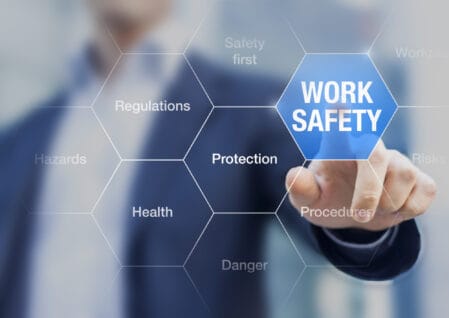Important Safety Topics to Cover at Your Next Meeting

Did you know that more than 5,000 work-related fatalities occurred in 2018 in the United States? That’s 2% more than the total number of deaths that happened a year before. Most of these unfortunate events can be attributed to negligence as well as a lack of understanding when it comes to workplace safety.
If you own a company, it’s paramount to have regular meetings and discuss various safety topics with your employees. Talking about different workplace dangers can make people more aware of their surroundings and the consequences of a common judgment error.
If you’re not sure what topics to cover in these safety meetings then keep reading. You’ll discover a few popular subjects that could increase workplace safety within your company.
1. Getting Distracted While Driving
Whether your workers transport goods with the company cars or shuttle people from one place to the other, a single moment of distraction can have disastrous consequences. Not only that distracted driving can cause damages worth thousands of dollars, but it can also be fatal in some cases.
There are multiple ways drivers can get distracted behind the wheel. For example, they might listen to loud music, talk on the phone, or get into road conflicts. To prevent such events and the unfortunate consequences they might bring, make sure that you discuss openly about distracted driving.
Ensure that your drivers also have a hands-free system while they’re out and about. This will allow them to talk with colleagues without taking their hands off the steering wheel.
2. Using Power Tools Carefully
Power tools are so useful these days, especially the cordless ones. They are portable, easy to use, and can get the job done quickly. However, they are also dangerous to operate. Make sure that your employees understand that they should never use power tools they haven’t received training for.
Power tool safety is important because various power tools can cause severe injuries such as finger cutting, items that might explode in one’s face, ricocheting bullets, etc. Even if your employees have years of experience using power tools, it’s still worth bringing up this subject once in a while as a refresher.
3. Avoiding Mold and Mildew
Mold and mildew are airborne impurities that develop in dark and humid places. If mold is not removed, it can accumulate in large quantities in warehouses and places where the humidity is high.
The problem with this type of impurities is that it can cause severe respiratory problems. Your employees might start to sneeze and cough more often. They might take days off because they need to treat their respiratory tract.
In worst-case scenarios, mold and mildew can cause asthma, and even chronic obstructive pulmonary disease (COPD). Such conditions are serious and they might lead to a significant decrease in your personnel’s productivity levels.
That’s why you should instruct your employees to be very careful with mold development. They should always ensure proper airflow in every room, particularly warehouses and bathrooms. They should clean and disinfect areas they are using often to prevent the accumulation of mold and mildew.
4. Acts of Violence in the Workplace
You are legally obliged to prevent and stop acts of violence in your own company. Such instances are rare, but they can take place if employees vent off anger on each other. Insults, name-calling, and aggressive behavior should be discouraged at all costs.
While discussing this topic, it’s worth mentioning a couple of ways employees can release pent-up anger without hurting each other. Going for a brisk walk around the building, taking a longer break, or talking with a friend on the phone are constructive ways to prevent violent acts in the workplace.
5. Wearing Appropriate Clothing Items
Many companies require employees to wear a uniform while performing their work duties. This is standard practice in most countries. However, this doesn’t mean that any type of clothing is permitted in places without uniform requirements.
In other words, wearing loose-fitting sleeves might cause work-related accidents and even injuries – so does wearing shoes with laces tied incorrectly. It’s worth discussing this topic with your employees because it directly affects their productivity and wellbeing at work.
6. Right Temperature Conditions
Humans are fragile creatures when it comes to temperature. Working in a hot environment such as poorly-ventilated commercial kitchens is likely dangerous. This can cause excessive sweating and it might lead to respiratory diseases.
At the same time, working in a very cold environment without wearing proper clothing is also dangerous. Make sure that you talk with your employees and instruct them to wear appropriate clothes at work. For example, a warm sweater is required for employees who arrange products in industrial refrigerators.
7. Carbon Monoxide Poisoning
Carbon monoxide is a dangerous gas because it’s odorless and colorless. It can be very toxic and it might lead to fatalities if the victim doesn’t get exposed to a fresh supply of oxygen quickly. There is a high risk of carbon monoxide poisoning in places where boilers, furnaces, and gas-powered generators are operating.
Ideally, you should install carbon monoxide detectors in these areas. Make sure that your employees know about them and act quickly if the alarm is ringing. Your employees also need to know where emergency exits are located and those exits shouldn’t be blocked or locked.
Carbon monoxide poisoning can also happen as a result of pipe leaking. It’s important to conduct periodic plumbing inspections and replace old pipes if necessary. A single leak can cause thousands of dollars worth of damage as well as serious health problems.
Discussing Safety Topics With Employees
The old proverb says that “it’s better to be safe than sorry.” Bringing up these safety topics during your work meetings is going to make your employees more responsible. Such discussions might also save lives and make your workers feel more protected in your company.
